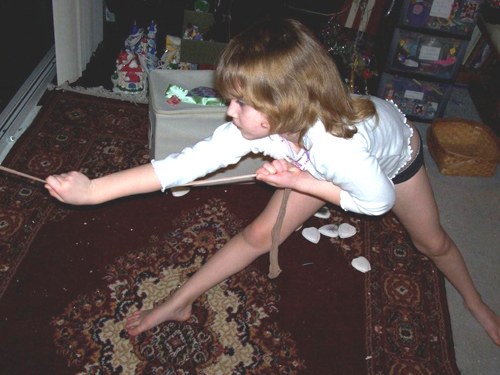
There is no doubt that one day, in the fullness of time and at the right time, Jayn will become a reader. I have no doubt that she will slide into reading with the relatively effortless grace that so many other Unschoolers report of their children as they gain literacy with their parents’ support in their text-filled environments.
Of course I will be happy for her, as a whole new world of ease will open up to her. I will be proud of her abilities and acceptant of her choices regardless of whether she becomes a great reader of literature, a researcher, a consumer of pop culture, a dabbler, or some idiosyncratic combination of all. She is already a storyteller, so the ability to read and to write privately will expand her options there. But I’m in no hurry.
In keeping with my own increasing understanding of myself, believing someone has to take on being the “Black Hat Thinker” (see Six Thinking Hats by Eduard de Bono), I am always able to see the negatives of any situation. When I look at our life now, Jayn’s pre-literate life and activities, I can see that there are things that are likely to be lost once she can read for herself.
When I was young I was a huge reader of fiction. I am so still, time permitting. I have no recollection of not being able to read, but nor do I have any record of my age when I started. My grandmother had kept a box of my mother’s books from her childhood—delightfully quaint now but au-courant-then schoolgirl novels with titles like The Girls of Greycourt and The Dominant Fifth; the entire collection of Anne of Green Gables books, as well as the lesser known Emily of New Moon trilogy; a few rare Australian novels written in the late 1940’s and earlier. I must have been about nine when Nan gave me these for my own and I made my first acquaintance with the bizarre gender confusion of Enid Blyton’s Famous Five (“as good as a boy” indeed) and the idea of novels in a long series. I still love the English boarding-school novel genre, especially as it has been reinvented by one J.K. Rowling in recent years.
Reading novels was an escape from my everyday life. Like many others report, I was so able to immerse myself in the world of whatever novel I was reading that I would easily become oblivious to the real world around me. There were several occasions when I read past my bus stop—but then I got to read on the backtracking journey so that was a bonus, provided I looked up in time to hail the approaching bus. I remember once in high school suddenly feeling the silence, looking up and realizing that I was alone in the vast grassy play ground. The bell had rung and everyone gone inside all unnoticed by me at some undetermined time before. Luckily the teacher took a humorous attitude to my tardiness.
However my avid reading during every spare moment was not so valued by my mother. I remember being forbidden to bring my book along on outings because it was “rude” to read while visiting. I will add that these were visits to aging aunts or adult friends of my mother, not places with other children to play with—afternoons of unending heavy boredom, desperately scanning for bookshelves or magazines, finding dog-eared Reader’s Digests in the bathroom, anything printed to make the time go by faster. I suppose my mother’s fear was that her friends would be offended if I brought anything along that hinted that I found them uninteresting (as if I were part of the adult conversations anyway!), whereas I always felt like having a good book along was like insurance against a bad time.
Perhaps my mother resented the complete self-reliance that my reading created. I was perfectly happy alone, perfectly independent and without need.
When, in due course, Jayn can read for herself, she will enter a world where she too will have a level of skillful self-reliance that will remove some of her need of me, remove me from her service.

Jayn is also in charge of when she wants translating to occur. Often she impatiently says to me, “don’t read the descriptions,” able simply to ignore intrusive text in a way that readers—who automatically scan and decode any text that falls under their eyes—just can’t. Her pragmatic need for help fosters the connection between us. We have so much intimacy as I learn about her thought processes by helping her with her writing and recording of her ideas, and I follow her developing interests through reading web page URL’s for her or typing searches in the Google window.
On the other hand, reading may diminish some of the assured self-reliance that she currently has. For example in pursuing her latest fascination, cooking, Jayn has no need of recipes. She follows her own creativity adding condiments or making sauces. She enjoys experimenting with the heat levels of the pans on the stove, noticing when eggs cook too quickly or bacon frizzles.

Of course the wonderful worlds of literature and information will be even more available to her once she can read. At present her access to the great stories and histories are filtered by my memory or the creative realization of others in films or pictorial media. Every film she sees, every museum diorama will eventually function as a hook of familiarity when she comes to read the novel or seek out the rest of the story. I suspect that when her reading skill initially flowers she will immerse herself in it for a time, possibly to the exclusion of her more manual activities. Or not. What wonderful uncertainty.
Jayn’s march to reading is as inexorable as her journey to physical maturity, her increasing empathy, her growing awareness as her world widens, and her increasing understanding of social relationships.
Inexorable and inevitable, and surely it will be with joy that I must welcome the new skill and all it will open for Jayn. Every new stage of independence must be welcomed because my alternative would be fighting nature’s reality or diving into overwhelming sadness for what is past. Our children need us to celebrate their development with them, and I know that celebration is better than sorrow.
Without any pushing, independence will come at the right time for Jayn’s needs. Without any pushing, her only struggles will be with her own impatience—not any of mine. At the right time Jayn will launch herself into the world of independent discovery through solitary reading, and I will see less of her. I will have to wait to be invited into her private world that presently is a place that is always open to me. And I will treasure the memory of when I was as essential to her understanding as I hope to always be to her heart.
She will be a reader. But I’m in no hurry.
(another back-up copy, with better links, here:
when-jayn-reads-vintage-article.html)


